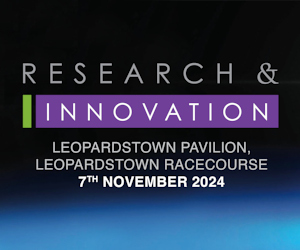Trinity researchers lead the design of a new futuristic eco-friendly aircraft

Researchers at Trinity College Dublin’s School of Engineering have been selected to lead an EU consortium in the design of a futuristic aircraft that produces less noise pollution and carbon footprint.
The School of Engineering is co-ordinating three EU projects that have a combined budget of €5.4m to improve the way people fly in Europe.
The latest project called ARTIC is worth €1.4m and is focused on the development of a novel, quieter landing gear system for the next generation ‘greener’ aircraft.
Collaborating with the Trinity College Dublin researchers on the project is aircraft manufacturer Alenia Aermacchi, along with SMEs and researchers from other EU institutes.
ARTIC falls under an EU FP7 public-private partnership called Clean Sky.
Clean Sky was set up with sustainable development in mind, and associated projects seek to bring significant changes to the way aeroplane manufacturers design and develop new equipment in response to their damaging environmental impact.
In excess of 2bn people use air transport each year, and although the carbon emissions only amount to around 2pc of the total man-made emissions, this is set to increase to 3pc by 2050.
In addition, noise pollution is a growing concern with increased flight traffic affecting hundreds of thousands of people living near major airports and frequently used flight paths.
“The standard plane we hop on to fly to Paris is fuel-inefficient for such a short-haul distance,” explained Dr Gareth Bennett, assistant professor in mechanical and manufacturing engineering at Trinity College Dublin, who will be leading the project.
“In addition, the fuel and noise emissions into our environment need to be reduced. The Clean Sky Partnership will result in a replacement aircraft design which will be significantly greener, and it will happen soon.”
Reaching for cleaner skies
ARTIC will build on research and development led by Bennett and his team on two other ongoing Clean Sky projects, called WENEMOR and ALLEGRA.
All three projects co-ordinated by Trinity College Dublin will contribute directly to the overarching Green Regional Aircraft (GRA) EU programme, directed by Alenia Aermacchi. This programme will result in the GRA being the most commonly used aircraft in Europe in the next few years for short-haul trips, and will be used as the aircraft of choice by airlines.
The WENEMOR consortium (€2m) designed and built a 1/7th-scale aircraft and cutting-edge design Counter Rotating Open Rotor (CROR) propeller engines, while the ALLEGRA team (€2m) is testing new noise abatement technologies to reduce the noise made by the landing gear, which exceeds engine noise on the approach to landing.
Bennett added: “Noise is a significant bottleneck to the growth of the EU aviation industry, which is a huge employer. Airbus and Alenia Aermacchi, for example, are trying to design quieter aircraft to remain competitive against US manufacturers, such as Boeing.”
An eye on the Horizon
After testing the new landing gear design, which was built at half-scale, Bennett and his team will now make the equipment and underside of the GRA aircraft at full-scale as a main component of project ARTIC. They will put the combined model through its paces in the largest wind tunnel in Europe (DNW-LLF), which is 20m high and located in Holland.
“Testing such a design at this scale has never been done before in Europe and the EU aviation industry is eagerly awaiting our results,” added Dr John Kennedy, research fellow in Bennett’s group, and a senior technical manager working on each of these projects.
“It is very exciting to be part of this project, which I’m sure will make a huge contribution to improving the sustainability of air transportation in the coming years.
“Alenia Aermacchi are extremely pleased with Trinity’s capacity to co-ordinate these large-scale projects and have already indicated that they would like us to engage with Clean Sky 2, which is due to start at the end of the year and which is part of Horizon 2020.”








There are no comments at the moment, do you want to add one?
Write a comment